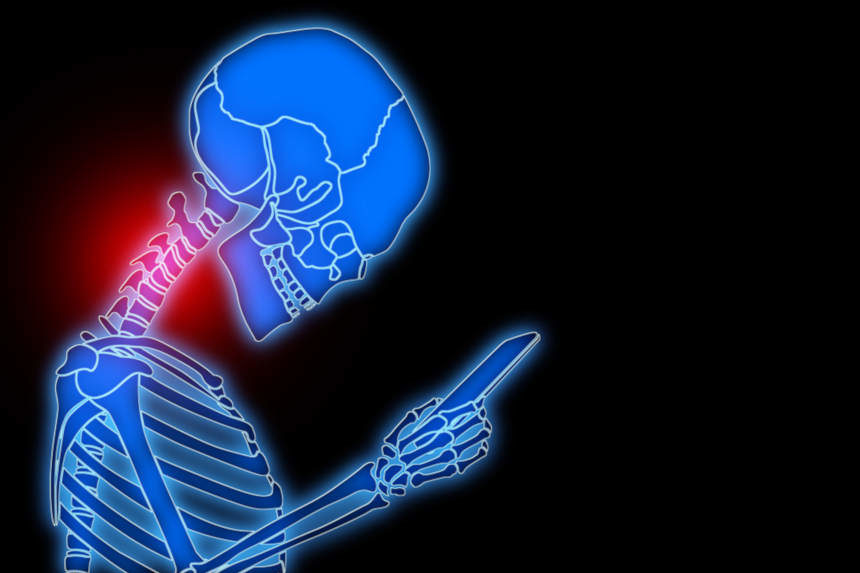“Your Health Checkup” is our online column by Dr. Douglas Zipes, an internationally acclaimed cardiologist, professor, author, inventor, and authority on pacing and electrophysiology. Dr. Zipes is also a contributor to The Saturday Evening Post print magazine. Subscribe to receive thoughtful articles, new fiction, health and wellness advice, and gems from our archive.
Order Dr. Zipes’ new book, Damn the Naysayers: A Doctor’s Memoir.
“Curiouser and curiouser,” cried Alice during her adventure in Wonderland. That’s how I felt when I came across the two items I’ve highlighted in this week’s column. Both topics are products of our modern age, impact lots of people, and are “curiouser and curiouser.”
Text Neck
Text Neck, a term coined by chiropractor Dean L. Fishman, describes a syndrome of stress injury and pain in the neck from excessive watching or texting hand held devices over a sustained period of time Also called turtle neck posture or anterior head syndrome, such smartphone abuse can result in shoulder and upper back pain, headaches and increased curvature of the spine, resembling hunchback. The problem is especially pressing in young people because of the amount of time they spend texting. Almost 90 percent of U.S. teens 14 to 18 years old and 80 percent of U.K. teens 12 to 15 years old own and use smartphones, with an even higher percentage in adults 18 to 34 years old.
The reason for text neck resides in flexing the head forward 15 degrees to use and stare at a smartphone. That posture places about 27 pounds of force on the neck; the pounds increase with greater forward head tilt, so that a tilt of 60 degrees carries a weight of 60 pounds. Over time, the damage can progress to early onset cervical spine arthritis, spinal degeneration, disc compression, muscle weakness and loss of lung capacity.
To avoid text neck, hold the smartphone in a higher position to reduce neck flexion. Avoid excessive usage and static posture with prolonged typing and take frequent breaks. Strengthen neck muscles with exercise programs and regular movement. Use ice packs and massage to relieve stress and pain. With severe pain, medication (avoid opiates), joint injection, or acupuncture can be tried.
Acid Reducers and Allergies
The second curious development hits close to home. I’ve taken a stomach acid inhibitor (esomeprazole, Nexium®) for many years to suppress acid reflux heartburn. Over the past few years, I have developed for the first time in my life classic allergic symptoms in spring and fall with itchy eyes, sneezing and so forth.
A recent study analyzing health insurance records in an Austrian population found that individuals buying gastric acid inhibitors like Nexium were far more likely to also purchase anti-allergy drugs, while people using other commonly prescribed drugs such as statins and antihypertensives were not. The findings implied that people taking the gastric acid inhibitors, but not other common drugs, developed an increase in allergic symptoms with a resulting need for allergy-relieving medications. The association was more common in women and occurred with all assessed gastric acid-inhibiting substances. As little as six daily doses per year were sufficient to increase the risk for subsequent anti-allergic medication use, suggesting that the effect occured early after drug use.
The mechanism appears related to an increase in the base/acid balance (increase in pH) of stomach juices that affect protein and pancreatic digestion, which in turn changes the body’s response to antigens such as pollen that trigger allergies.
The old adage, “There’s no such thing as a free lunch,” rings true. Everything we do, every medication we take, comes with some baggage. One must choose carefully to make sure benefits outweigh risks.
But it is “curiouser and curiouser.”
Featured image: Shutterstock.
Become a Saturday Evening Post member and enjoy unlimited access. Subscribe now



